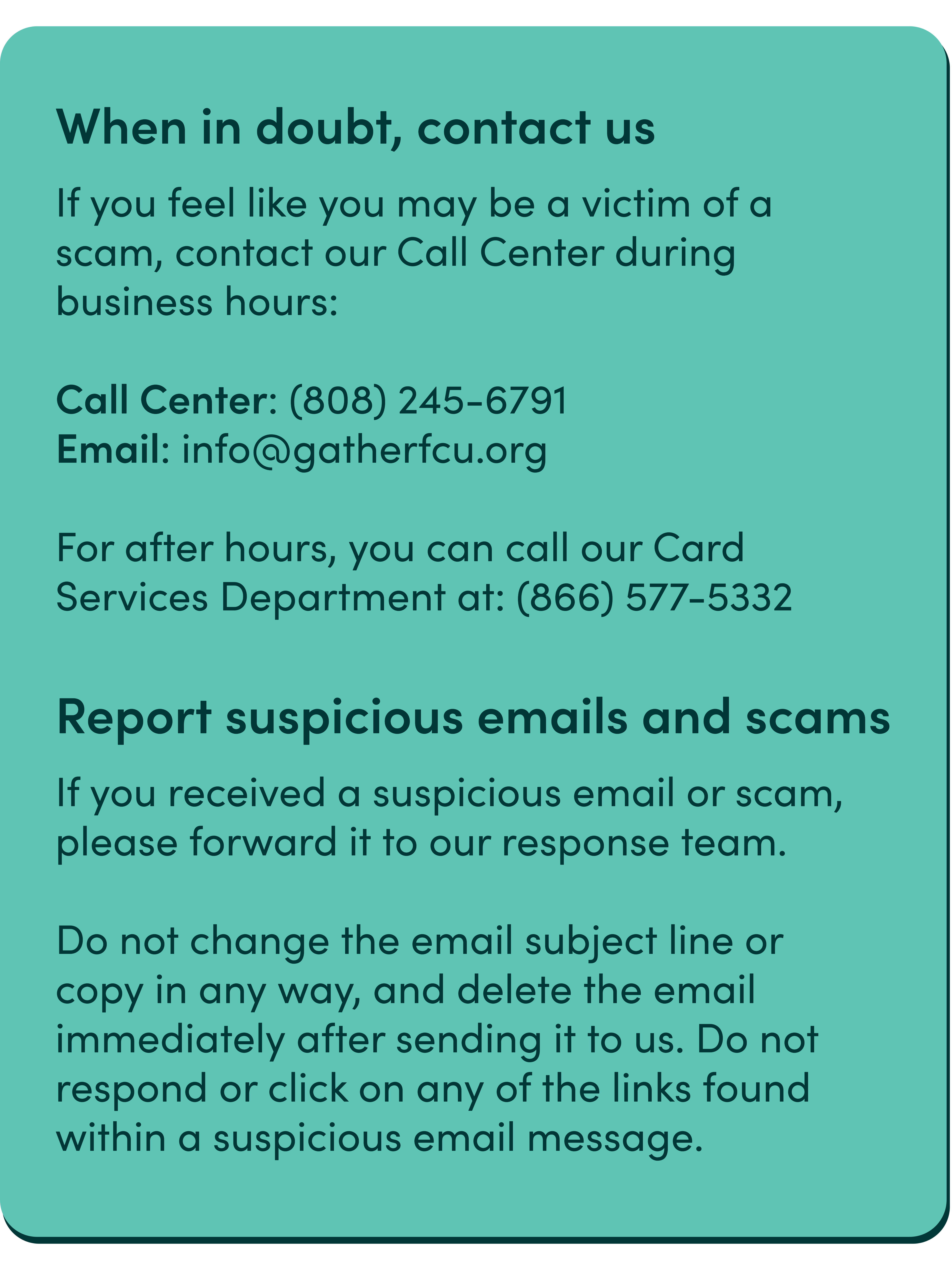October is National Cybersecurity Awareness Month
Cybersecurity Awareness Month highlights the importance of protecting our digital lives.
Today, cybersecurity is a major concern across the globe. We’ve seen cybercriminals disrupt essential services, target elections, and hold businesses and organizations for ransom. With more people relying on digital technology every day, the number of ways attackers can strike continues to grow.
As technology advances, so do the tactics used by malicious cyber actors, and each of us has a responsibility to protect our systems and secure information. We all have an important role to play in cybersecurity.
Here are some quick tips for Financial Safety Online:
- Keep Your Transactions Secure.
The Internet is a public network. Therefore, it is important to learn how to safeguard your credit union account information, credit card numbers, Social Security number and other personal data.
- Secure Your Computer.
Clicking on the wrong link can leave you open to scammers, hackers, and identity thieves. Learn experts' top tips for how to protect your information and your computer while online. Read more.
- Think Before You Click.
Receive an email claiming you can get a very low interest rate on a mortgage if you just click on the link? See an ad on a website that promises you can erase a negative credit score with just one click? Following suspect links like these can lead to a website with a virus designed to steal your information.
If it looks too good to be true, it probably is a scam.
Online Safety Basics
Learn How to Spot a Scam
Scams often use urgent language to pressure you into making quick decisions, such as “Immediate action required.”
Be suspicious of prizes, free gifts, or offers that seem overly generous and unrealistic, as they are often meant to mislead.
Be cautious of unsolicited requests for sensitive details like your Social Security number, passwords, or account information.
Scammers may try to scare you with claims like “Suspicious login activity detected” or “Your account has been locked.”
Helpful Reminders
.png) Gather FCU will never call, text or email members asking for sensitive information.
Gather FCU will never call, text or email members asking for sensitive information.
Including your Digital Banking credentials, account numbers, passwords, or multi-factor authentication (MFA) one-time passcodes.
.png) Scammers may contact you by phone, email, or text.
Scammers may contact you by phone, email, or text.
They can even spoof caller IDs to appear as "Gather Federal Credit Union" or "Gather FCU." If you receive an unsolicited request for sensitive information, hang up or ignore the message. Stay cautious and never share personal details.
.png) If in doubt, verify the authenticity of any communication you receive.
If in doubt, verify the authenticity of any communication you receive.
Contact us directly using our official contact information. You can also find official contact information on your account statements.
.png)
Learn About Different Types of Scams
By far, the most common type of fraud is the imposter scam.
Imposter Scams involve fraudsters posing as representatives or employees of banks, credit unions, or other trusted organizations. These scammers often contact you via phone, email, or text message, pretending to be someone you know or trust, such as a bank employee, government official, or charity representative. They may claim there’s an urgent issue with your account, request personal information, or ask for your debit or credit card information. Their goal is to deceive you into sending money or revealing sensitive information, which they then use for financial gain.
What to do: Always be cautious of unsolicited requests for personal information or money. Verify the source by contacting the organization directly using known contact details, and don’t trust caller ID alone. Avoid making quick decisions under pressure and never send money or gift cards to unknown recipients. Keep in mind that government officials and agencies would never call you about official business or ask you to wire money or purchase gift cards.
Phishing is a scam that uses fraudulent emails, phone calls, or text messages to trick consumers into disclosing sensitive information, such as credit card numbers, bank account details, Social Security Numbers, and passwords. It is a common form of social engineering where attackers impersonate legitimate companies, banks, credit unions, or organizations to deceive victims and commit identity theft for financial gain.
What to do: Be cautious of unsolicited phone calls or messages asking for personal or banking information. Legitimate financial institutions will never ask for online banking credentials or personal confidential information over the phone or through messages.
Do not click on links or attachments in messages from a number that you don’t recognize. Do an online search to verify the website or phone number yourself and contact the entity to confirm the validity of the email or text you received.
Another common form of online banking fraud, identity theft occurs when a criminal obtains or uses the personal information, e.g., name, password, Social Security number (SSN), date of birth, etc., of someone else to assume their identity or access their accounts for the purpose of committing fraud, receiving benefits, or gaining financially in some way.
What to do: Do not give your personal information to someone who calls, emails, or texts you. It could be a scammer trying to steal your information. Frequently review your bank account and credit card and statements. If you notice anything unusual, such as unfamiliar transactions and charges report it immediately to your financial institution.
These scams start with great news: You’ve won a prize. There’s a catch. They will ask you to pay money or provide an account number upfront for fees and taxes before you can claim the prize. An account number can allow a criminal to siphon money out of your account, and money paid to collect your prize is gone forever.
What to do: Ignore any emails saying you won a foreign lottery. And if you didn’t enter a contest in the first place, know that you didn’t win. Real sweepstakes are free, by chance and almost always require you to enter to win.
Romance scammers create fake profiles on dating sites and apps or contact you through popular social media sites. You meet someone special on a dating website or app. Soon they want to email, call, or message you off the platform. They say it’s true love, but they live far away — maybe for work or because they’re in the military. Then they start asking for money. Maybe it’s for a plane ticket to visit you. Or emergency surgery. Or something else urgent.
What to do: Be smart about who you connect with and what information you share online. Never send money to someone you don’t know, even if they’ve professed their love to you. Never share sensitive personal information, such as bank account or credit card numbers, Social Security number, with a new love connection.
Charity scams deceive people into donating to fraudulent or misrepresented charitable causes. Fraudsters will often time these scams to coincide with natural disasters, such as wildfires, hurricanes or floods, exploiting the urgency and vulnerability of affected individuals and communities. These scams can take many forms, including traditional online donations and fundraisers, and crowdfunding (i.e. GoFundMe).
What to do: Be alert for overly emotional charitable appeals that say little about what the charity intends to do with your donation. Do not give in to the sense of urgency and the excessive pressure – take time to do your own research before you donate. You can verify an organization’s authenticity through platforms like the Better Business Bureau’s Scam Tracker, Charity Navigator, Charity Watch, or the IRS Tax Exempt Organization search tool.
Government scams are when scammers pose as government officials and attempt to steal your personal information.
Social Security scams: Scammers pose as officials from the Social Security Administration and send you a realistic-looking email with a fake statement for you to download and review. Upon clicking the attachment, malicious software is installed on your device. The scammer then gains full access to your computer, allowing them to steal your personal information.
For more information, please refer to this April 2025 Social Security Administration (SSA) Scam Alert.
IRS scams: Fraudsters impersonate an IRS official, calling and demanding payment for unpaid or overdue taxes. They often use intimidation or threats of jailtime to frighten victims into providing banking or card information to facilitate payment.
What to do: Never click on links or download attachments from unexpected emails, especially if they claim to be from a government agency. When in doubt, go directly to the official government department website or contact them through verified channels. Also remember that the real IRS will never call you to demand payment or request personal information. If you receive a call demanding payment, hang up immediately.



